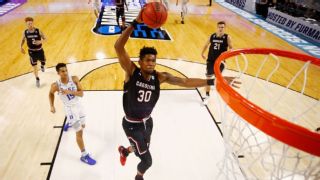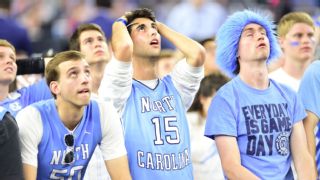Part of that is (obviously) size. Existing in the same vicinity as a 7-foot-1, 300-pound human being brings forth a weird primal anxiety your 6-foot-6 high school buddy (no offense, John) simply does not elicit.
It's more than that, though: In all that size, Gonzaga's senior center also has speed, footwork, vision, touch. All of the qualities you find impressive in a young point guard and unfathomable in a center are, to various degrees, right here. In that. How?
Now imagine this physiological marvel -- now the winningest player in the history of Division I men's college hoops -- rocking himself back and forth in his own bed just to build the momentum to plop onto his apartment floor. Where he would crawl. For an hour. To his crutches.
If there is any one moment when the 2016-17 Gonzaga Bulldogs officially became a Final Four-level team, it came in May, when, thanks to a medical hardship waiver and the decision to postpone a potential European career, Karnowski announced his return.
The words "medical hardship waiver" are not exactly the stuff of inspirational sports documentaries, but rarely has "medical hardship" been more accurately applied. Karnowski's slipped disc, followed by multiple complications -- all stemming from a fluke fall during practice -- left Gonzaga's coaching staff wondering less about his minutes and more about whether their beloved bearded big man would ever be able to comfortably enter a motor vehicle again.
"Initially it was just, we gotta help this kid somehow to just get back to normal activity, a normal life where he can get up out of bed," Gonzaga coach Mark Few said. "And it was a struggle to fit a 7-foot, 300-plus-pound guy into a car and get from point A to point B. It's a miracle that he's here playing. It really, truly is."
Not only is Karnowski playing, he's playing as well as he ever has, taking the skills he developed as a sophomore and junior -- namely, his remarkable blend of low-post strength and touch, plus his best-in-class post passing -- and putting them to use as the fulcrum of Gonzaga's 36-1 run to the Final Four.
Yes, Few's team would have been very good without Karnowski. His backup, freshman NBA draft prospect Zach Collins, has been just as efficient in his minutes on the floor. But no one is more beloved by his teammates and coaches. And no player in the Final Four -- or in all of college basketball -- manages to marvel, physically, quite like this. He's a long way from crawling across carpet.
Chris Boucher's awkward fall chasing a rebound in Oregon's 73-65 win over California in the Pac-12 tournament wasn't enough to make anyone believe he was seriously injured.
The 6-foot-10 senior forward -- the team's leading shot-blocker, second-leading rebounder and third-leading scorer -- still went on to play 12 more minutes in the second half.
When a postgame MRI revealed a tear in the anterior cruciate ligament in his left knee, his season was officially over.
And Oregon's Final Four hopes could have gone with it. Defensively the Ducks were the No. 1 team in the nation in percentage of blocked shots. Boucher led the Pac-12 and was 15th nationally averaging 2.6 blocked shots per game.
The moment the Ducks became a Final Four team was the moment they rallied around Boucher's injury rather than ran from it.
"I said at the beginning, we would win with me or without me," Boucher said. "A lot of people said it won't happen, but we compete. It's always next man. Everybody's got to stay ready. That's why we're here now."
The Ducks don't have another stretch-4 who can knock down 3-pointers at a 35 percent clip like Boucher. But they don't need one.
Tyler Dorsey, who averaged 13 points at the time of the injury, has since compensated for Boucher's 11.8 points per game. Dorsey has scored at least 20 points in the Ducks' five games without Boucher, including a game-high 27 points in the Ducks' Elite Eight win over Kansas. He's the leading scorer in the NCAA tournament.
Ask the Jayhawks if the Ducks had a rim protector on the floor in the Midwest Regional final. Jordan Bell set a school NCAA tournament record with eight blocks against Kansas, and if there was a stat that counted altered shots or intimidated players it would have been in the 20s.
"[Bell]'s been big for us," senior guard Dylan Ennis said. "With Chris going out, we tried to get the whole team to pick up the slack. Jordan decided to do it on his own. I'm happy we have him. He does so much for us."
There were other moments that shaped Oregon this season.
There was the 74-69 loss at Colorado, where the Ducks had begun feeling a bit too chesty riding a 17-game winning streak. Dorsey said the loss to the Buffs "woke us up."
Then came the 82-79 loss at UCLA, where Oregon squandered a double-digit lead. Ennis said they learned "we can't take our foot off the gas."
Oregon hasn't slowed down since.
Even without Boucher to help their drive.
-- C.L. Brown
SOUTH CAROLINA GAMECOCKS

Shutting down Duke
See it coming? Uh no, no one saw this coming. Who could? South Carolina didn't merely limp into the NCAA tournament, the Gamecocks crawled on their bellies backward.
South Carolina lost six of its nine games before the first round tipped off, including its first game in the SEC tournament, and that vaunted defense that has stymied everyone the last two weekends? It was giving up a fairly porous 48 percent shooting from the floor in those defeats. A team that hung its hat on defense for much of the year had lost some of its edge.
So what happened? How did a team that fell apart disastrously in an avert-your-eyes four-overtime loss to Alabama a little more than a month ago end up in the Final Four?
Thank Duke.
Nothing riles the inner underdog quite like seeing the Blue Devils on the opposing bench. Coach Mike Krzyzewski's program, no matter its own tumult, remains a standard bearer, especially in March.
And let's be honest. No one gave South Carolina a chance in that second-round game. Heck, ticket brokers in New York were busy trying to figure out how to amass their ducats for that much anticipated Duke-Villanova Elite Eight game at Madison Square Garden as soon as the bracket was unveiled.
"We weren't paying attention,'' Sindarius Thornwell said of the proposed Elite Eight matchup. "The whole time we felt like we can win. The only people that mattered [are] the people in our circle, the people that [are] at practice with us, the people that [have] been with us from the jump. They've seen us grind."
Grind is, in fact, a most apt descriptor because that is what the Gamecocks did to Duke in the second half of that game -- ground the Blue Devils to a halt. The 65 points amassed in the final 20 minutes stole the headlines, but it was what South Carolina did defensively that changed the game, and ultimately set the Gamecocks' March run in motion.
The Blue Devils, 5-of-8 from the arc in the first half, fell to 5-of-19 in the second. They committed 18 turnovers, their offensive game plan completely upended by South Carolina's defense.
And that defense, really, is what created that stunning offensive onslaught.
From that game -- from that half, more specifically -- South Carolina found itself some new mojo and an identity. The Gamecocks are gritty grinders who may lose style points but win games.
"That's who we are,'' Martin said. "That's what it's all about. People talk about guys transferring out. They leave because they don't want to play as hard as Sindarius Thornwell or Duane Notice. We play hard in practice. We play hard in games.''
Now the Gamecocks bring that play-hard attitude to Phoenix in the Final Four.
And they can thank Duke for pushing them there.
-- Dana O'Neil
NORTH CAROLINA TAR HEELS

The pain from 2016's title game
On April 4, 2016, Kris Jenkins shot Villanova into eternity with a 3-pointer and game-winner over North Carolina to win the national championship for the Wildcats.
Tar Heels fans throughout NRG Stadium cried in the bleachers and left the building wondering how the mighty Tar Heels had fallen after that piercing conclusion to their 2016-17 season.
That moment became the motivation for a North Carolina squad that will return a year later to the Final Four after its last-second win over Kentucky in the Elite Eight on Sunday.
"All of us on the team, that was our ultimate goal last year to win the championship," Isaiah Hicks told reporters at the South Regional in Memphis. "We [were] four seconds away from that. Just to see your dream taken away right in front of you, that's all the motivation you need. Of course nobody likes to lose, but that one, when you're right there, all of us, we just need that second chance."
North Carolina pursues national titles. That's common sense in college basketball.
So any player who signs with the Tar Heels understands the legacy.
Last year, Michael Jordan and the other North Carolina greats watched Jenkins hit that shot in Houston. That's the spotlight that comes with the North Carolina legacy.
Had North Carolina lost by 30 points in the national title game last season, this year's Tar Heels would have still entered the season seeking a third ring for coach Roy Williams.
Style matters here, though. North Carolina was down by 10 points with nearly five minutes to play in that game. Then, the Tar Heels launched a miraculous 17-7 rally to tie the game 74-74 before Jenkins donned his cape.
They'd fought so hard only to see Jenkins nullify that late push.
So even though the program lost its best players, Marcus Paige and Brice Johnson, the returnees never lost that feeling or forgot that image.
They used that emotion to win an ACC championship, and then, to roll into the Elite Eight with a dominant victory over Butler in the Sweet 16.
Then, they followed that with a win over Kentucky, then the hottest team in the field after entering Sunday's game on a 14-game winning streak, to advance to Phoenix for a chance to avenge last season's result.
But this time, the Tar Heels hope they're the team celebrating in the end.
"I think it did make those guys work harder in the offseason," Williams told reporters in Memphis.
-- Myron Medcalf

